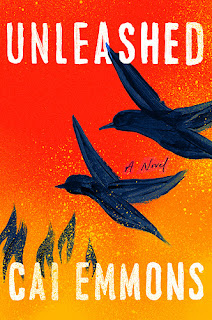Cai Emmons is the author of the new novel Unleashed. Her other books include the novel Sinking Islands. She has taught at various universities, including the University of Southern California and the University of Oregon, and she lives in Eugene, Oregon.
Q: In your Author's Note for Unleashed, you write, “It wasn't until months later, after several revisions of the novel, just before I was given a diagnosis of bulbar-onset ALS, that I understood something about what I'd written: it was my body's chronicle of a developing disease, a metaphorical autobiography of sorts, though nothing about it borrowed anything from my actual life.” Can you say more about that?
A: This novel roared out of me in an unusual way. I didn’t pause much to think about what I was doing; I simply knew it had to be written, and I wrote it fast, even as I felt the premise was much too weird for publication.
The experience was far less an act of cognition than it was an outcry. A protest. I was writing before my disease had been diagnosed, but certain symptoms had begun to appear, most notably the erosion of my voice. As I began to understand I might be progressing to muteness, I developed a keen sense of kinship with animals. My utterances sometimes sounded like growls.
Simultaneously, with the pandemic altering our lives, along with the shenanigans of Trump and his cronies, escape from the world as we know it began to feel very appealing. I will leave it at that, as I can’t say more without revealing too much!
Q: The writer Lacy Crawford said of the book, “Unleashed is a clever and audacious novel that enacts the disruption it depicts, carrying the reader from deft contemporary realism to vivid surrealism that feels, somehow, like coming home.” What do you think of that description, and what do you see as the balance between realism and surrealism in the novel?
A: I felt that Lacy understood the book I intended to write, and I was very pleased with the way she described it.
I have always felt that all the surreal aspects of my work speak to real or true aspects of human psychology—they are not random. So, in some ways, I see the book—all my work—as being entirely realistic because it speaks to human nature as I see it.
How human beings perceive and respond to the world’s complexities, how we think and feel in the midst of trouble and joy, these are the things that interest me most about writing. Surrealism, or a tweaked reality, is sometimes the best tool for probing the inscrutability of human nature.
Q: How would you describe the dynamic among your characters Lu, George, and Pippa?
A: Lu, George, and Pippa are the three moving parts of a small nuclear family trying to redefine itself on the occasion of Pippa leaving home. Splintered from each other and their usual habits, each of them is undergoing changes that could not have been foreseen.
Human lives and relationships are never static, though they sometimes feel that way, and these characters find themselves seized by the quick tides of change. As they change individually, their relationships change, and that becomes an important part of the story’s engine.
I think of them as circling in an orbit together then, as the speed of the orbit increases, they are flung onto separate trajectories.
Q: What do you hope readers take away from the story?
A: I expect readers will take different things from the story, as there are various elements that might arrest them, but for me, this is a story about liberation from expectation, particularly in Lu’s case.
I hope it will help readers reflect on what is constraining them from finding their own paths to liberation and joy in a world that so often seems to be on a collision course.
Q: What are you working on now?
A: I have been reflecting so much on this idea of the world being in dire straits, the feeling that not only is the climate being eroded to the point of making our planet very unpleasant and possibly uninhabitable, while at the same time so many forces of cruelty have been unfettered.
It has felt to me that Evil is prevailing over the forces of good for the first time in my life. So I wanted to explore this idea of Evil. I don’t know that I ever really believed in Evil before—I have always thought that all people were ultimately redeemable, but now I am not so sure.
But that is a very abstract idea to explore, so I needed, as novelists do, to find a story to embody this exploration. After many false starts, many abandoned characters and storylines, I have found characters I am very engaged with, and I am close to finishing a rough draft.
It will certainly go through numerous revisions, maybe even some page-one rewrites. I usually do at least eight drafts of a novel.
Q: Anything else we should know?
A: For those who don’t know, I was diagnosed with bulbar-onset ALS in February 2021, and I’ve lost my ability to speak. My limbs are gradually weakening, but I can still walk, drive, write longhand, type, and communicate with text-to-voice devices. It is unclear when my end will come, but I hope to write to the bitter end!
If you’re interested in more about my life with ALS, you can find it at my blog which is on my website: www.caiemmonsauthor.com and Medium @caiemmons, as well as on Facebook @CaiEmmonsBooks.
--Interview with Deborah Kalb. Here's a previous Q&A with Cai Emmons.


No comments:
Post a Comment